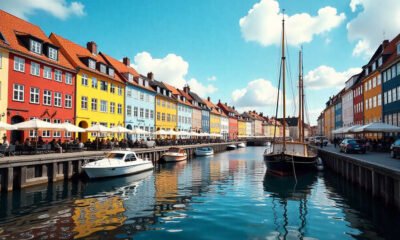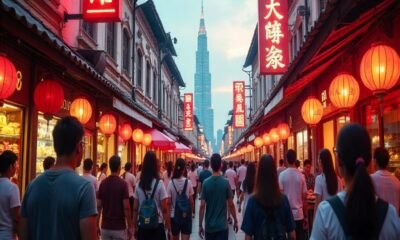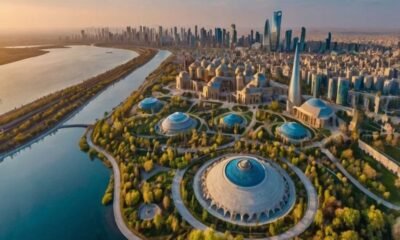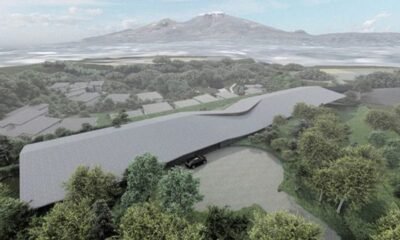Wellness Travel
Japan, Vietnam, China, India, Malaysia, Singapore, Thailand, Indonesia, and New Zealand Drive Asia-Pacific’s Explosive Growth in Authentic Wellness Travel for Summer 2025
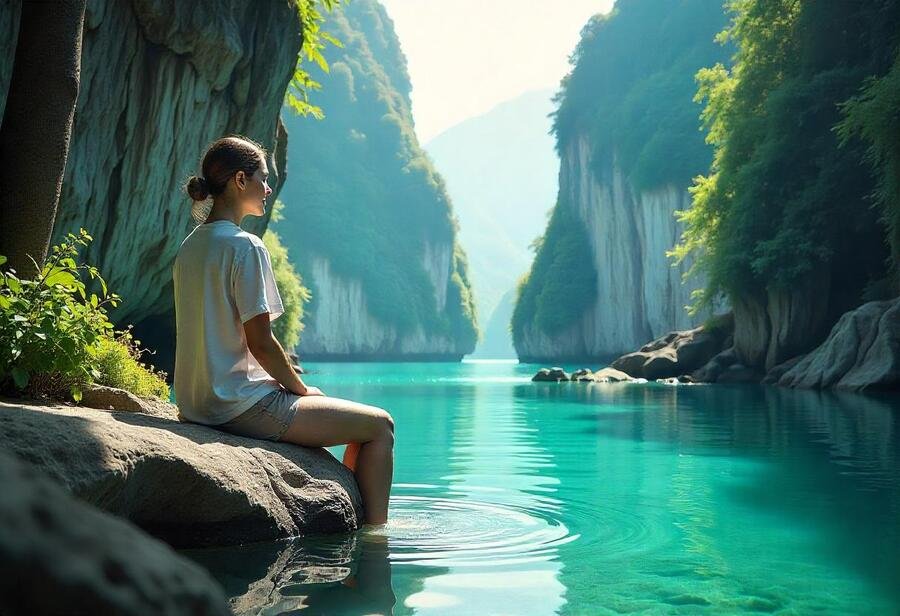
Wednesday, May 21, 2025
Japan, Vietnam, China, India, Malaysia, Singapore, Thailand, Indonesia, and New Zealand are spearheading a remarkable surge in Asia-Pacific’s summer travel market for 2025, driven by growing demand for authentic and wellness-focused experiences. Factors such as expanding middle classes, improved flight connectivity, and travelers’ shifting priorities toward meaningful cultural immersion, nature, and holistic wellbeing are fueling this explosive growth. These countries offer diverse attractions—from Japan’s vibrant cities and Vietnam’s coastal charm to Thailand’s renowned wellness retreats and New Zealand’s pristine landscapes—making the region the premier destination for purposeful summer travel this year.
Rising Destinations and Evolving Travel Drivers
Japan remains the standout destination this summer, while Vietnam’s coastal city of Nha Trang is quickly becoming a favorite for travelers seeking new experiences. Between June and September 2025, Tokyo and Osaka register the strongest growth in visitor numbers, reflecting a notable shift in tourism demand. Tokyo notably climbed from second place in 2024 to become the most sought-after city worldwide, while Nha Trang made a striking entrance on the list of trending hotspots.
China and India continue to dominate as the primary sources of outbound travelers in Asia. Mainland China held its position as the world’s largest outbound market in 2024, with Chinese tourists gravitating toward affordable destinations offering streamlined visa processes, such as Japan, Malaysia, and Singapore. Meanwhile, interest in Central Asian countries like Kazakhstan, Uzbekistan, and Kyrgyzstan is also on the rise.
India saw record-breaking outbound travel in 2024, with popular destinations including Abu Dhabi, Hanoi, and Bali. This surge is supported by expanded direct flight options and a growing middle-class population, reinforcing the critical role these markets play in shaping international travel patterns.
Shifting Traveler Preferences: Food, Nature, and Wellness at the Forefront
Across Asia-Pacific, tourists are moving away from conventional sightseeing in favor of immersive experiences centered on local cuisine, natural landscapes, and wellness activities. Locations such as Gianyar in Bali and Queenstown in New Zealand are seeing heightened interest. The Mastercard Wellness Trend Index identifies Thailand as a global leader in wellness tourism, attracting visitors with eco-conscious accommodations and meditation retreats. New Zealand’s climbing wellness scores further emphasize this growing market segment.
Sports tourism is also expanding rapidly, with international events like the Australian Open and the Baseball World Series in Los Angeles driving significant tourist spending. These events continue to serve as strong motivators, contributing substantially to the economic vitality of host cities.
Currency Fluctuations Shape Travel Patterns
Travelers from the Asia-Pacific region exhibit heightened sensitivity to currency changes. The weaker Japanese yen throughout 2024 encouraged a surge in inbound tourism to Japan. Research indicates that a one percent depreciation of the yen against the Chinese yuan corresponded with a one and a half percent increase in Chinese visitors. In contrast, similar currency shifts produced smaller visitor increases from countries such as New Zealand and the United States.
Record numbers of Singaporean tourists visited Japan in 2024, fueled by a forty percent appreciation of the Singapore dollar against the yen, despite rising travel and lodging costs.
Similarly, travelers from India, Singapore, South Korea, and Taiwan showed responsiveness to fluctuations in the US dollar. A one percent decline in the dollar’s value relative to these currencies was linked to a roughly zero point six to zero point eight percent rise in tourist arrivals. These findings highlight the influential role of exchange rates in shaping travel demand.
Business Travel Evolves and Security Remains a Priority
Business travel is shifting focus toward regional trips rather than global journeys. While the total number of business trips has decreased, their duration has increased. For example, the average length of US-based business trips to Asia-Pacific expanded from about nine days to just over ten.
Security concerns remain prominent, especially during peak travel seasons when fraud incidents can spike by up to twenty-eight percent in major tourist destinations. Common scams include inflated charges in eateries and taxis, fake tour operators, and deceptive rental listings, underscoring the need for vigilance among travelers.
Japan, Vietnam, China, India, Malaysia, Singapore, Thailand, Indonesia, and New Zealand are driving Asia-Pacific’s rapid growth in summer 2025 travel by offering authentic cultural experiences and world-class wellness destinations that meet evolving traveler priorities. Expanding middle classes and improved connectivity are fueling demand for meaningful, wellness-focused journeys across the region.
This report highlights the dynamic and evolving travel landscape, with Asia-Pacific leading the way toward purposeful tourism centered on authentic cultural engagement, wellness, and value. Despite economic challenges, the desire for meaningful and enriching travel experiences continues to drive the industry forward worldwide.
Wellness Travel
NCL ushers sea change in self-care – TTN Worldwide
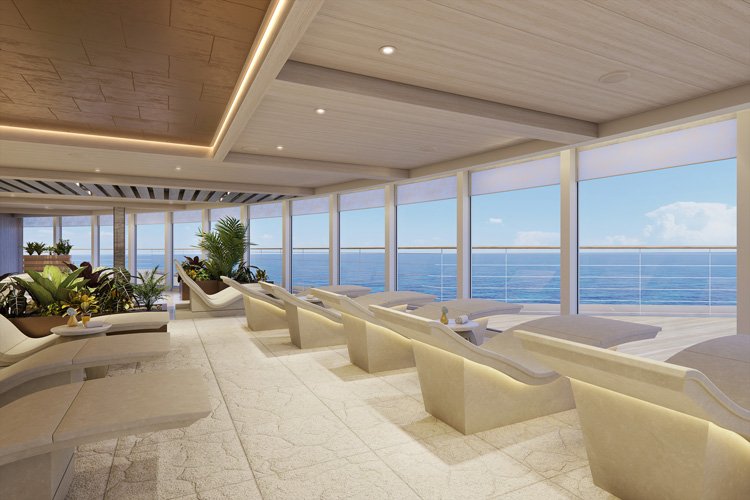
NCL ushers sea change in self-care TTN Worldwide
Source link
Wellness Travel
Step Into The Future Of Travel At The Philippine Travel Mart 2025,Where Innovation, Wellness, And Green Adventures Await: What You Need To Know
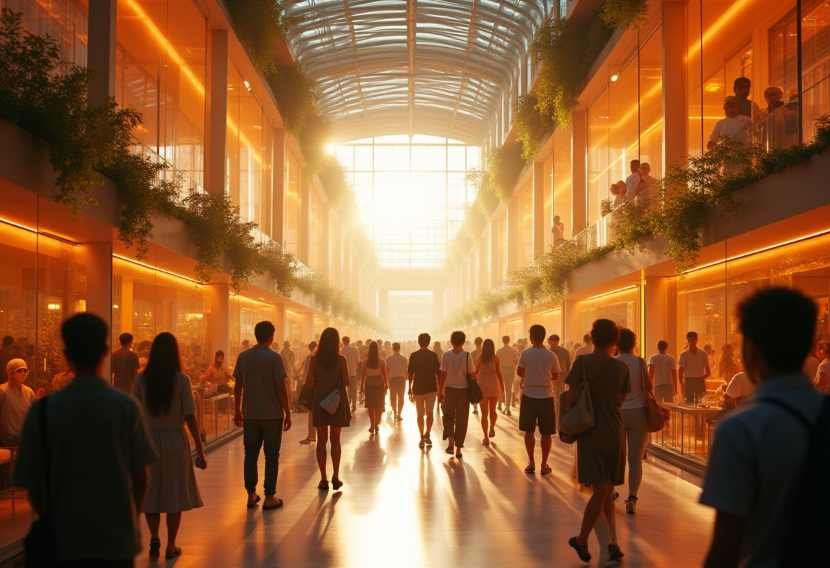
Saturday, August 2, 2025
The Philippine Tour Operators Association (PHILTOA) officially launched the 36th Philippine Travel Mart (PTM) with a media event at The Peninsula Manila, giving a preview of what promises to be a landmark tourism expo in 2025. The event, set to take place from September 5–7, 2025, at the SMX Convention Center Manila, brings together key players in the tourism and travel industry, showcasing an evolution in how the Philippines is positioning itself as a leading travel destination for the next generation of global explorers.
Thematic Focus: Boosting the NextGen Tourism
This year’s theme, Boosting the NextGen Tourism, reflects a forward-thinking approach to travel and tourism, addressing the evolving preferences of modern travelers. The theme is founded on four pillars—sustainability, digitization, inclusivity, and health and wellness—which are central to shaping the future of tourism not only in the Philippines but across the globe.
The Department of Tourism and the Tourism Promotions Board co-present the event, with sponsorship from GCash, Philippine Airlines, and official partner EastWest Bank. These stakeholders are aligning their efforts with PHILTOA’s vision to redefine tourism experiences for future generations.
The Rise of Sustainable and Responsible Tourism
One of the most significant aspects of PTM 2025 is its emphasis on sustainability. With the global travel industry increasingly focusing on eco-friendly practices, the event aims to promote green travel, eco-tourism, and responsible tourism. Visitors can expect to see exhibitors that highlight eco-conscious destinations, products, and services that are leading the way in sustainable tourism.
Philippine destinations renowned for their natural beauty, such as Palawan, Bohol, and Siargao, are already working on initiatives to protect local ecosystems, reduce carbon footprints, and promote the responsible use of natural resources. These practices are aligned with global trends, where tourists are more aware of their environmental impact and are seeking out destinations and experiences that support sustainability.
At PTM 2025, attendees will gain insights into how green tourism can be integrated into travel packages, with a focus on eco-friendly resorts, local farm-to-table dining, and conservation initiatives that protect the country’s rich biodiversity. This emphasis on sustainability is poised to attract eco-conscious travelers from around the world, making the event a key platform to showcase the Philippines as a sustainable destination.
Digitization: Transforming the Travel Experience
In an age where technology is shaping almost every aspect of our lives, the digitization of tourism is another critical focus of PTM 2025. The tourism industry is rapidly adopting new technologies such as AI-driven experiences, smart travel tools, and cashless transactions to streamline the travel experience. These innovations are designed to make travel more seamless, efficient, and personalized.
At PTM 2025, visitors will get a first-hand look at how artificial intelligence (AI) and machine learning are enhancing customer service, from AI-driven travel booking systems to virtual tours that bring destinations to life before travelers even set foot in the country. Travel agencies and tour operators will also present smart mobile applications that allow travelers to plan their trips, manage bookings, and make payments—all at the touch of a button.
The integration of cashless payments through platforms like GCash further enhances the convenience for travelers, ensuring that they can make transactions seamlessly. This move is particularly important in post-pandemic travel, where contactless transactions are preferred for safety and efficiency.
Inclusivity in Tourism: Meeting the Needs of All Travelers
PTM 2025 places a strong emphasis on inclusivity, ensuring that tourism is accessible to everyone, regardless of their background or physical ability. With more people than ever seeking diverse travel experiences, the Philippines is committed to providing options for solo travelers, families, senior citizens, and persons with disabilities (PWDs).
Exhibitors at the event will present inclusive travel packages that cater to these various groups, showcasing destinations that offer accessibility features such as wheelchair-friendly accommodations, senior-friendly tour packages, and special services for solo travelers. This move is a response to the growing demand for accessible travel and the recognition that tourism should be open to all, regardless of their specific needs.
For example, popular destinations like Tagaytay, Baguio, and Davao have been increasingly offering accommodations and experiences designed with accessibility in mind, including accessible transport, braille signage, and wheelchair-accessible amenities. PTM 2025 will serve as a platform to showcase these efforts and encourage other destinations to adopt similar inclusive practices.
Health & Wellness: The New Travel Trend
Wellness tourism is another key trend that will take center stage at PTM 2025. Travelers today are increasingly focused on their health and well-being, seeking rejuvenating experiences that combine relaxation, physical fitness, and mindfulness. From yoga retreats in Palawan to wellness resorts in Cebu and mindful exploration tours across the Visayas, the Philippines has a growing array of wellness offerings.
Exhibitors at PTM 2025 will showcase wellness tourism packages that allow visitors to disconnect, relax, and rejuvenate in tranquil, natural settings. Whether it’s a spa retreat, meditation experience, or a holistic wellness journey, PTM 2025 is set to highlight how the Philippines is becoming a hub for wellness tourism in Southeast Asia.
As wellness becomes a priority for modern travelers, PTM 2025 will also explore the ways in which mental health and well-being are being integrated into the tourism industry. This includes offering travelers not only physical relaxation but also opportunities for emotional healing and spiritual growth through carefully curated wellness programs.
What to Expect at PTM 2025
Attendees at PTM 2025 can look forward to:
Over 300 exhibitors, featuring a mix of local and international tour operators, travel agencies, airlines, hotels, and resorts.
Exclusive travel deals on flights, hotel accommodations, and tours across the Philippines and abroad.
Cultural performances, traditional shows, and live demonstrations that celebrate Filipino culture.
Interactive sessions on sustainability, technological innovation in travel, and inclusivity, with experts offering insights on the future of tourism.
Raffles and prizes, with the chance to win exciting travel packages and experiences.
Ticket Information
Tickets for the 36th Philippine Travel Mart are available online. Early bird tickets are priced at ₱100, available until July 31, 2025, after which the regular rate of ₱120 will apply.
Conclusion: The Future of Philippine Tourism Starts Here
The 36th Philippine Travel Mart serves as a pivotal platform in the evolving landscape of Philippine tourism. By embracing sustainability, digitization, inclusivity, and wellness, this year’s event underscores the Philippines’ commitment to shaping a travel industry that is not only more innovative but also more responsible and accessible to a global audience.
As tourism continues to adapt to changing trends and consumer preferences, PTM 2025 positions the Philippines as a destination that is ready to meet the challenges and opportunities of the future. Whether you’re a travel enthusiast, industry professional, or someone looking for inspiration, PTM 2025 is an event you won’t want to miss.
Wellness Travel
A wholly trinity of wellness in Bali
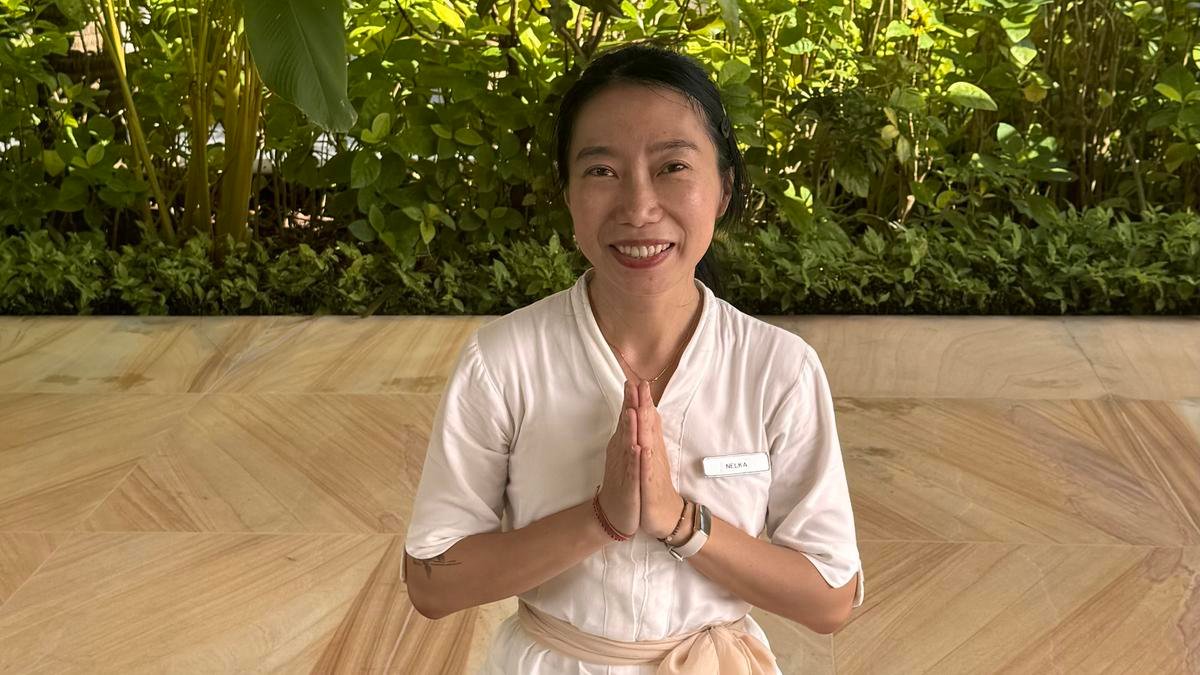
Anyone looking at my browsing history 18 months ago would have found multiple searches for Pilates retreats, affordable retreats, and retreats where coffee isn’t banned.
Every retreat I looked at seemed to be too expensive, too long, or too hard to get to in my timeframe.
The more I looked, the less appealing it sounded to be eating set meals and attending twice daily exercise bootcamps.
I’ve discovered it’s easier to work wellness into a Bali stay. Most resorts have great accommodation/meal packages, including access to well-equipped fitness centres with a program of free and paid activities to enrich the mind and body.
Wellness Unbound is Nusa Dua resort The Mulia’s way of letting guests unwind at their own pace, embracing mindfulness, immersive cultural enrichment, nourishment, healing and movement.
Try a free 7am yoga class in the Eden Garden. Need more sleep and some extra help mastering those poses? I take a 9am private yoga class (from $66 per person per hour), sweat like there’s no tomorrow, then have an omelette, coffee and glass of antioxidant-packed jamu at The Cafe.
If you’re a guest of the suites or villas and want to avoid the temptations of the buffet, The Lounge offers a la carte options. Start with a fruit plate and fresh juice, then move on to an egg white and asparagus omelette.
Add in an afternoon class of dancercise, aerial yoga, or mat Pilates. More of a team player? Sign up for beach soccer, volleyball, tennis or ping pong.
After all that exercise, try a session in the Mulia Spa wellness suite with sauna and Asia Pacific’s first ice room (from $47 per person for 30 minutes). Book the hot and cold hydrotonic pool and it’s all yours for the session (from $29 per person for 30 minutes). There’s no sharing with strangers like many Aussie bathhouses.
I have a cultural enrichment session with Ni Wayan Weli, starting with Balinese dance moves. She looks graceful. I do not. Then I learn how to make a canang, the Balinese offerings basket, and to weave a red, white and black Tridatum the traditional bracelet that represents the three gods of Hinduism. These free activities are available to all guests.
Open since mid 2024, The Meru Sanur all-suite hotel sits in the Sanur Special Economic Zone for health and wellness tourism.
The Meru’s poolside breakfast buffet at Arunika has a clearly labelled wellness section with dishes including Bircher muesli, chia pots and grilled vegetables. There’s a gluten-free station, plenty of fresh fruit and two types of jamu.
Activities include yoga, aero boxing and soccer on Sanur’s longest and whitest stretch of beach.
Guests can go on a transformative journey at the recently opened Taru Pramana Spa and Wellness centre, where a wellness apothecary can create you a personal elixir, infused oil, or botanical balm.
I enjoy a relaxing massage with sound healing and the sleepier I get, the more I am convinced several people are in the room playing the singing bowls next to my head. Staff assure me it really was just the work of one therapist. The spa has changed since my visit, but a similar experience starts from $175 for two hours.
The Meru’s gym is in use by Indonesia’s national soccer team each morning of during my stay, so the equipment comes highly rated.
I’m one of only two in a free aqua aerobics class in the Bali Beach Pool – Sanur’s largest – which the resort shares with the Bali Beach Hotel.
A bike ride or healthy 10 to 15-minute stroll along the beachfront to the new Icon Bali Mall is recommended if your idea of wellness also involves retail therapy.
At The Laguna Resort and Spa in Nusa Dua, guests can learn how the immune-boosting elixir jamu is made as part of the 5.45pm daily Jamu Ritual at De Bale Bar and Lounge.
The activity celebrates Indonesia’s wellness and herbal heritage, with the featured jamu changing quarterly. I sip Loloh Cemcem, traditionally made from cemcem leaves (Spondias pinnata) in Penglipuran, a village in the Bagli regency.
On Thursday nights as dusk descends, a traditional Balinese story comes to life through dance and music performed by local students.
I’m so engrossed, I get a shock to find a performer dressed as a monkey has snuck up on me. It’s another way The Laguna helps preserve Balinese culture by weaving it into each stay.
After the performance, I am invited to a blessing ceremony outside the resort’s Hindu temple, complete with grains of sacred rice on my forehead and the gift of a Tridatu bracelet.
The ceremony is watched by the resort’s resident duck and chicken. Legend has it they escaped has being sacrificed and now roam the grounds as protectors.
Staying in shape at The Laguna is easy at the 24-hour gym with views of a lagoon pool and waterfalls. I finish my stay with a blissful one-hour traditional Balinese massage (from $150) while water flows outside.
+ Sue Yeap was a guest of The Mulia, The Meru Sanur and The Lagua Resort and Spa. They have not influenced this story, or read it before publication.
fact file
themulia.com
themerusanur.com
marriott.com
-

 Brand Stories2 weeks ago
Brand Stories2 weeks agoBloom Hotels: A Modern Vision of Hospitality Redefining Travel
-

 Brand Stories1 week ago
Brand Stories1 week agoCheQin.ai sets a new standard for hotel booking with its AI capabilities: empowering travellers to bargain, choose the best, and book with clarity.
-

 Destinations & Things To Do2 weeks ago
Destinations & Things To Do2 weeks agoUntouched Destinations: Stunning Hidden Gems You Must Visit
-

 Destinations & Things To Do1 week ago
Destinations & Things To Do1 week agoThis Hidden Beach in India Glows at Night-But Only in One Secret Season
-

 AI in Travel2 weeks ago
AI in Travel2 weeks agoAI Travel Revolution: Must-Have Guide to the Best Experience
-

 Brand Stories4 weeks ago
Brand Stories4 weeks agoVoice AI Startup ElevenLabs Plans to Add Hubs Around the World
-

 Brand Stories3 weeks ago
Brand Stories3 weeks agoHow Elon Musk’s rogue Grok chatbot became a cautionary AI tale
-

 Asia Travel Pulse4 weeks ago
Asia Travel Pulse4 weeks agoLooking For Adventure In Asia? Here Are 7 Epic Destinations You Need To Experience At Least Once – Zee News
-

 AI in Travel4 weeks ago
AI in Travel4 weeks ago‘Will AI take my job?’ A trip to a Beijing fortune-telling bar to see what lies ahead | China
-

 Brand Stories4 weeks ago
Brand Stories4 weeks agoChatGPT — the last of the great romantics

